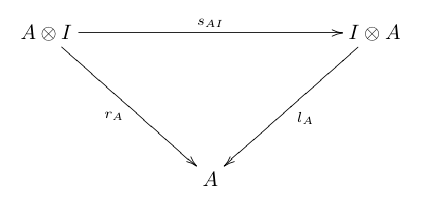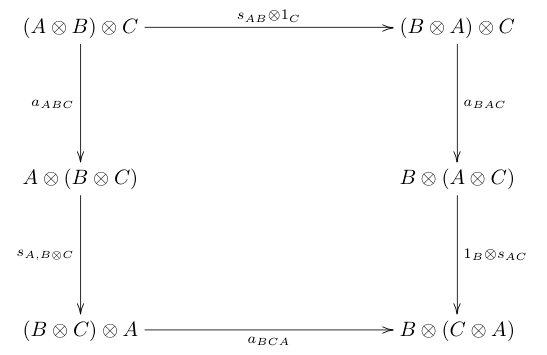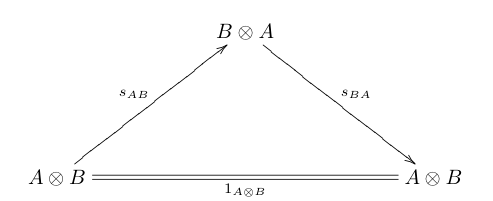Symmetric monoidal category
In category theory, a branch of mathematics, a symmetric monoidal category is a monoidal category (i.e. a category in which a "tensor product" is defined) such that the tensor product is symmetric (i.e. is, in a certain strict sense, naturally isomorphic to for all objects and of the category). One of the prototypical examples of a symmetric monoidal category is the category of vector spaces over some fixed field k, using the ordinary tensor product of vector spaces.
Definition
A symmetric monoidal category is a monoidal category (C, ⊗, I) such that, for every pair A, B of objects in C, there is an isomorphism that is natural in both A and B and such that the following diagrams commute:
- The unit coherence:
- The associativity coherence:
- The inverse law:
In the diagrams above, a, l , r are the associativity isomorphism, the left unit isomorphism, and the right unit isomorphism respectively.
Examples
Some examples and non-examples of symmetric monoidal categories:
- The category of sets. The tensor product is the set theoretic cartesian product, and any singleton can be fixed as the unit object.
- The category of groups. Like before, the tensor product is just the cartesian product of groups, and the trivial group is the unit object.
- More generally, any category with finite products, that is, a Cartesian monoidal category, is symmetric monoidal. The tensor product is the direct product of objects, and any terminal object (empty product) is the unit object.
- The category of bimodules over a ring R is monoidal (using the ordinary tensor product of modules), but not necessarily symmetric. If R is commutative, the category of left R-modules is symmetric monoidal. The latter example class includes the category of all vector spaces over a given field.
- Given a field k and a group (or a Lie algebra over k), the category of all k-linear representations of the group (or of the Lie algebra) is a symmetric monoidal category. Here the standard tensor product of representations is used.
Properties
The classifying space (geometric realization of the nerve) of a symmetric monoidal category is an space, so its group completion is an infinite loop space.[1]
Specializations
The dagger symmetric monoidal categories are symmetric monodal categories with an additional dagger structure.
A cosmos is a complete cocomplete closed symmetric monoidal category.
Generalizations
In a symmetric monoidal category, the natural isomorphisms are their own inverses in the sense that . If we abandon this requirement (but still require that be naturally isomorphic to ), we obtain the more general notion of a braided monoidal category.
References
- ↑ R.W. Thomason, "Symmetric Monoidal Categories Model all Connective Spectra", Theory and Applications of Categories, Vol. 1, No. 5, 1995, pp. 78– 118.
- Symmetric monoidal category in nLab
- This article incorporates material from Symmetric monoidal category on PlanetMath, which is licensed under the Creative Commons Attribution/Share-Alike License.


